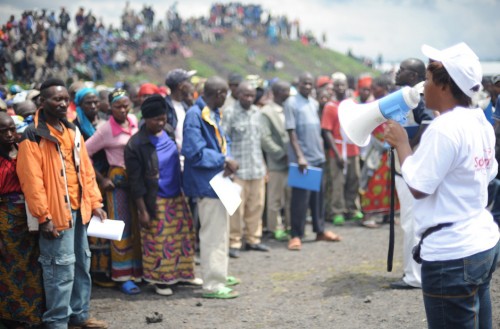Image: NGO workers prepare to distribute aid at a refugee camp in Rwanda (Photo: Julien Harneis).
Aid workers are increasingly seen as legitimate targets by combatants. The 2014 Aid Worker Security Report, published to mark World Humanitarian Day, reveals that the number of aid workers injured or killed in the space of 12 months rose by 66% between the end of 2012 and the end of 2013.
The latest figures show that the overwhelming majority of victims are local staff. Of the 460 aid workers who were victims of violent attacks in 2013, 59 were international workers and 401 were nationals.
This imbalance between international and local staff is not new. Of the 143 aid worker victims in 2003, 116 were national and 27 were international. But the figures also show clearly that two things have changed for the worse; the number of victims is three times higher than it was a decade ago, and the relative proportion of local aid worker victims has also increased significantly. In 2003, they were four times more likely than their international colleagues to come under attack. By last year, this ratio had risen to 6:1.
“NGO legitimacy is likely to be highly contested in fragile situations, and will rise and decline in response to changes in the political climate.”
In the past NGOs were generally seen as having more legitimacy than governments or private companies. Sadly, events in countries such as Afghanistan have changed things. Where NGOs have been involved with peace initiatives and statebuilding programmes, they have often worked closely with international military actors to ‘win hearts and minds’. This has damaged their credibility with some social and political groups.
International NGOs are the most high-profile actors, but national NGOs often bear the lion’s share of the responsibility – and risk – of working in conflict and post-conflict settings. This makes aid work a very risky career choice indeed for local people, especially given the significant shift in NGO work since the 1990s. Once there only to deliver services and give humanitarian help, they are now also involved in building popular support for peace processes, rebuilding community relations, or changing attitudes to conflict.
Given the global increase in violent attacks against NGO workers in recent years, there is clearly an urgent need to understand how NGOs generate and hold onto legitimacy. Three key findings have come out of my examination of the experience of national NGOs in three conflict zones – Sri Lanka, Nepal and the Occupied Palestinian Territories.
– The credibility of NGO sectors has been damaged by a growth in foreign funding and by the increasingly close links that NGOs have with international funders.
In all three conflict zones, links with foreign donors have increased internal competition among NGOs. Growing concerns about this have become closely bound up with broader concerns about the legitimacy of international efforts to build peace. The growth in NGO-funding has fuelled accusations that such organisations pose a threat to state sovereignty, or that they are being used to pursue the political agendas of their donors. When NGOs have been seen to be competing for foreign funding, they have been labelled as ‘crows who have come in search of dollars’ and start to be seen as traders in an emerging ‘peace market’.
– The boundaries between previously distinct categories of NGO work, and between NGOs, international donors and the state, have become blurred.
In Sri Lanka, frequent newspaper articles alleged that NGO resources had been misappropriated by Tamil Tiger rebels. When NGOs take on peace-building roles, they have to cross political, institutional and territorial boundaries, and this increases uncertainty about who they are, what they are doing and why they do it. It can damage their legitimacy – in the eyes of international as well as domestic stakeholders, as BBC Radio’s File on 4 report on navigating counter-terrorism laws points out. In all three conflict zones, there was frequent criticism of NGOs that had worked in rebel-held territories, or tried to build links between different political groups or ethnic communities.
– NGO legitimacy is heavily politicised in regions affected by conflict, where the state and other domestic political actors are themselves struggling for legitimacy.
In the Occupied Palestinian Territories, Hamas and Fatah have quite different visions of a legitimate political settlement and the most desirable road to peace. This means that NGOs in the region have often found themselves in the position of ‘damned if they do, damned if they don’t’. They know they could be criticised for working with Israeli organisations, receiving funding from certain western donors, or working closely with the Palestinian National Authority. From the other direction, they could be criticised by liberal international actors if they refused to work with Israeli organisations, or opposed the peace process in any way.
The conclusion? Generating NGO legitimacy in conflict or post-conflict zones is not simply a question of bolstering accountability, transparency or effectiveness. Instead, it has to be seen as connected to the fluctuating power relations and socio-political dynamics of each national context.
As recent news from Afghanistan shows, we can no longer assume that an ambulance, whatever symbol it carries, can pass unharmed. Perceptions of NGOs have changed, possibly for the foreseeable future in some regions. Donor and NGO staff perceptions must shift too to protect both their work and their workers.
It must always be assumed that NGO legitimacy is likely to be highly contested in fragile situations, and that it will also rise and decline in response to changes in the political climate.










